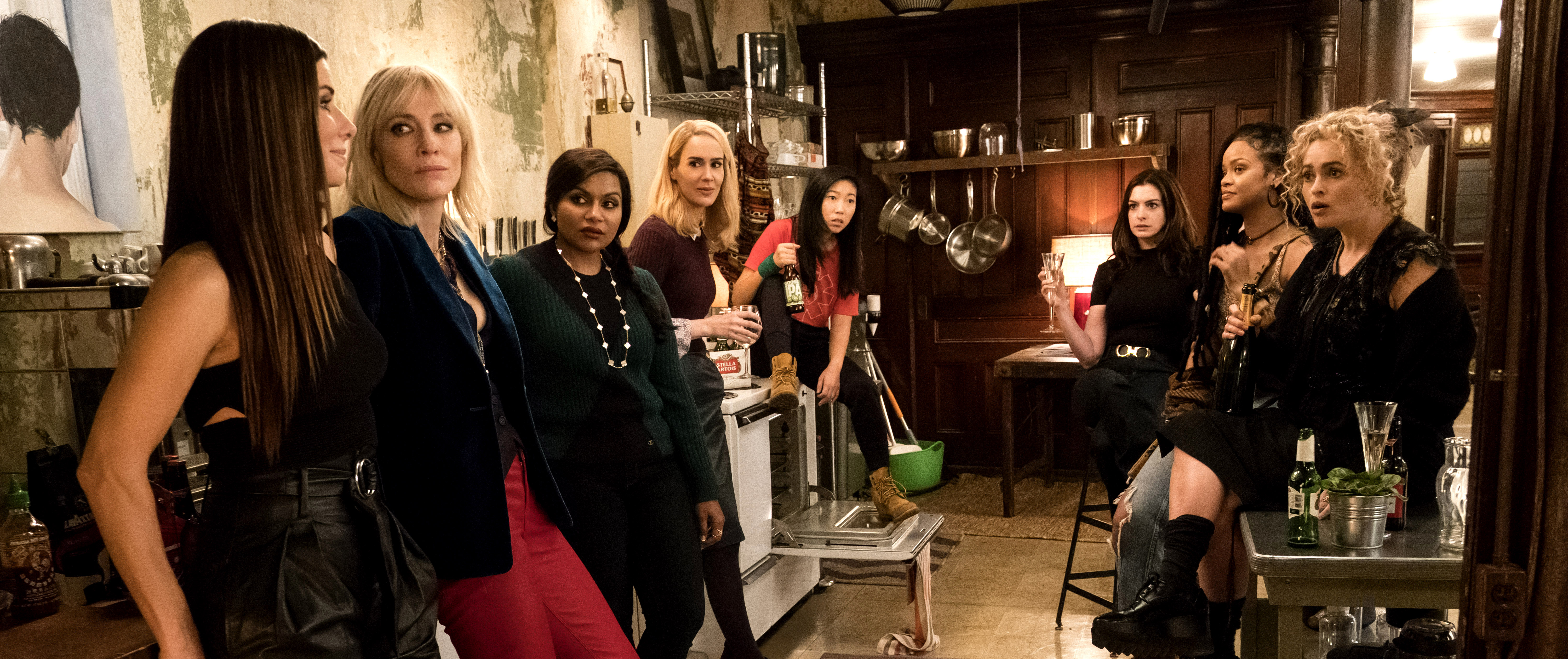How Ocean's 8 succeeded where Ghostbusters went wrong
Ocean's 8 doesn't pretend to be original. That's a good thing.


A free daily email with the biggest news stories of the day – and the best features from TheWeek.com
You are now subscribed
Your newsletter sign-up was successful
One of the best moments in Ocean's 8, Gary Ross' gender-swapped update of Steven Soderbergh's Ocean's 11 pictures, comes thanks to Tinder.
About halfway through the film and for no apparent reason, nimble-handed thief Constance (played by the rapper and comedian Awkwafina) decides to teach the demure jewelry maker Amita (Mindy Kaling) how to use the hook-up app. Ensconced in their crew's criminal lair, Constance and Amita take an abrupt break from fierce heist-planning to focus on romantic endeavors. They swipe left. They swipe right. They find a match — but not before Constance patiently explains the ins and outs of mobile matchmaking to the quite clueless Amita.
The bit is totally unrelated to Ocean's 8's overarching plot — which centers, of course, on a major heist — but it's a wonderful character flourish for both actresses. Amita does end up having dinner with a handsome suitor later in the film, but that development is a secondary payoff from Constance's training. The real value of the Tinder moment is how it brings a bit of real-world, modern, and relatable color to the two women. Unlike preceding attempts at flipping sexes for modern reboots of past hits, Ocean's 8 found the key to making the model work: self-possessed characters.
The Week
Escape your echo chamber. Get the facts behind the news, plus analysis from multiple perspectives.

Sign up for The Week's Free Newsletters
From our morning news briefing to a weekly Good News Newsletter, get the best of The Week delivered directly to your inbox.
From our morning news briefing to a weekly Good News Newsletter, get the best of The Week delivered directly to your inbox.
Ocean's 8 hits theaters Friday, spinning off from Soderbergh's movies more than a decade after the release of Ocean's 13. The film is the first major studio film to supplant male characters with women, following 2016's reboot of Ghostbusters.
Back in 2014, when Sony started the gears turning on Ghostbusters, the project that was met with instant polemic response. For defenders, the film was an attempt to claim franchises for women, who are rarely the leads in a studio tentpole system that favors male stars. For detractors, it was a certified threat to their childhood — and for the most sensational among them, a downright affront to male identity at large. The film was immensely polarizing, and worse, it buttressed a new trend in lazy blockbuster pitching: Take pre-existing intellectual property, from The Expendables to The League of Extraordinary Gentlemen to Kung Fu, and replace the men with women. Lather, rinse, repeat.
At first blush, Ocean's 8 shamelessly cribs the Ghostbusters blueprint: The motley-crew-steals-expensive-stuff plotline is familiar, but gone are George Clooney, Brad Pitt, Matt Damon, Bernie Mac, and the rest, with Sandra Bullock, Cate Blanchett, Anne Hathaway, Rihanna, Sarah Paulson, Helena Bonham Carter, Kaling, and Awkwafina seizing the reins from the men.
But Ocean's 8 diverges from Ghostbusters in two key ways. First, the Ocean's 11 movies lack the nostalgic pull of Ghostbusters; few people will claim that that Ocean's 8 has tainted their adolescence-defining recollections of the previous Ocean's movies. But more importantly, Ocean's 8 isn't simply a palette shift. Unlike the new Ghostbusters, which occurs in its own world and is divorced from the canon of Ivan Reitman's 1984 and 1989 films, Ocean's 8 takes place in the same world as the Ocean's 11 movies. Its protagonist, Debbie Ocean (Bullock), is the younger sister of Clooney's roguish anti-hero Danny Ocean.
A free daily email with the biggest news stories of the day – and the best features from TheWeek.com
The difference may sound like a ticky-tack technicality, but it is absolutely paramount to why Ocean's 8 works as well as it does. And it offers a valuable lesson for studios yearning to infuse known franchises with delightfully unabashed femininity.
The Ocean's 8 charcters do have their analogues: Debbie is cut from the same sly cloth as Danny; she likes lining her ducks in a row before shooting them, though she's less prone to Danny's cocky bluster. Lou (Blanchett), Debbie's right-hand woman, serves her as Rusty (Pitt) serves Danny, vetting candidates for their larcenous septet, shaping the plan, and facilitating its execution. Constance (Awkwafina) picks pockets with the same casual ease as Linus (Damon); she's slick, never flashy, and always quietly aware of her own talent. Even Debbie's low-key revenge plot with her ex-flame, Claude (Richard Armitage), echoes Reuben Tishkoff's (Elliott Gould) vendetta against Terry Benedict (Andy Garcia) in Ocean's 11.
But when you're rewiring an established series, similarities come with the territory, and similarity isn't the same as carbon-copying. Keeping Ocean's 8 in Ocean's 11's sandbox forces Ross' characters to be unique. They can't be exactly like the old characters, after all, because those guys still exist in this world. Lou is Rusty's parallel, but she isn't Rusty — she can't be, because every time Debbie mentions her brother, it's confirmation that Rusty, like the rest of Danny's crew, is still around. Debbie's familial allusions remind us that her brother's antics happened in the Ocean's 8 world, too — and that her hijinks are separate from his.
For Ocean's 8, that's a boon. Ross has no need to overlay his cast with the personalities of Soderbergh's. In fact, he is essentially barred from creating simple replicas. That affords the Ocean's 8 ensemble room to breathe and gives the women the freedom to be themselves.
It might seem that there's a troubling implicit message in this statement: that any female-centric reboots of formerly male-led franchises must avoid breaking ranks with their progenitors, instead remaining couched in male authorship. But this line of thinking misses the inborn benefits of the Ocean's 8 approach, as well as the problems of Ghostbusters: Stunts are fine, but they don't last, and Ghostbusters felt like a stunt. Movies like it demand little art and even less imagination. That doesn't mean that they can't be fun, it just means that surface-level gender exchange doesn't equate to inherent creativity — and that it's especially wasteful when you cast very talented women in roles that are little more than mirror images of existing male performances.
By contrast, you can't quite draw straight lines between the women of Ocean's 8 and the men of Ocean's 11. They may be influenced by the style and conventions of the franchise, but they're still standalone characters. Instead of watching Hathaway try to directly imitate, say, Bernie Mac, we get a quintessential Hathaway performance as she plays spoiled and breathtakingly bratty actress Daphne Kluger, sniping, vamping, and pouting her way through the film. (Watching her break down in tears as she's fit for her Met Gala dress by Bonham Carter's daffy fashion designer is a particularly marvelous scene.)
The authenticity doesn't feel contrived, either: Watching Constance walk Amita through Tinder, you get the sense that Awkwafina and Kaling get along famously in real life. More so than cool, convoluted heist sequences, it's the chummy hangout vibe of Soderbergh's Ocean's films that makes them such a pleasure to watch. Ross' Ocean's 8 nails that vibe and wields it masterfully to inform its new characters.
Bostonian culture journalist Andy Crump covers the movies, beer, music, and being a dad for way too many outlets, perhaps even yours: Paste Magazine, The Playlist, Mic, The Week, Hop Culture, and Inverse, plus others. You can follow him on Twitter and find his collected writing at his personal blog. He is composed of roughly 65 percent craft beer.
-
 Corruption: The spy sheikh and the president
Corruption: The spy sheikh and the presidentFeature Trump is at the center of another scandal
-
 Putin’s shadow war
Putin’s shadow warFeature The Kremlin is waging a campaign of sabotage and subversion against Ukraine’s allies in the West
-
 Media: Why did Bezos gut ‘The Washington Post’?
Media: Why did Bezos gut ‘The Washington Post’?Feature Possibilities include to curry favor with Trump or to try to end financial losses
-
 Walter Isaacson's 'Elon Musk' can 'scarcely contain its subject'
Walter Isaacson's 'Elon Musk' can 'scarcely contain its subject'The latest biography on the elusive tech mogul is causing a stir among critics
-
 Welcome to the new TheWeek.com!
Welcome to the new TheWeek.com!The Explainer Please allow us to reintroduce ourselves
-
 The Oscars finale was a heartless disaster
The Oscars finale was a heartless disasterThe Explainer A calculated attempt at emotional manipulation goes very wrong
-
 Most awkward awards show ever?
Most awkward awards show ever?The Explainer The best, worst, and most shocking moments from a chaotic Golden Globes
-
 The possible silver lining to the Warner Bros. deal
The possible silver lining to the Warner Bros. dealThe Explainer Could what's terrible for theaters be good for creators?
-
 Jeffrey Wright is the new 'narrator voice'
Jeffrey Wright is the new 'narrator voice'The Explainer Move over, Sam Elliott and Morgan Freeman
-
 This week's literary events are the biggest award shows of 2020
This week's literary events are the biggest award shows of 2020feature So long, Oscar. Hello, Booker.
-
 What She Dies Tomorrow can teach us about our unshakable obsession with mortality
What She Dies Tomorrow can teach us about our unshakable obsession with mortalityThe Explainer This film isn't about the pandemic. But it can help viewers confront their fears about death.
